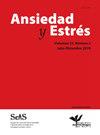求助PDF
{"title":"Emotional intelligence abilities of caregivers of patients with acquired brain injury and cognitive impairment: Are they related to overload or resilience?","authors":"I. De-Torres Garcia, F. Bustos, J. Arango-Lasprilla, P. Fernández-Berrocal","doi":"10.5093/anyes2022a6","DOIUrl":null,"url":null,"abstract":"Introduction: Acquired brain injury entails stressful situations of emotional complexity. Objective: To evaluate possible relationship among emotional intelligence, emotional status, resilience, and burden sensation of caregivers of patients with cognitive-behavioral impairment due to acquired brain injury in isolation circumstances because of COVID-19 pandemic. Material and methods: An observational descriptive cross-sectional study of prevalence was designed with a sample of 17 caregivers of patients with cognitive-behavioral impairment due to acquired brain injury. Main outcome measures: Caregiver Burden Interview, the 10-item Connor-Davidson Resilience Scale, Emotional Health, the Trait Meta-Mood Scale and the Positive and Negative Affect Schedule. Results: The median age of the 17 caregivers was 47.5 years, 71% of women had a median care-time of 3.5 years, and 65% of the total sample were spouses of the patients. 70% of the patients were affected by stroke (hemorrhagic or ischemic cause). 59% of the caregivers presented a low level of emotional attention and emotional clarity, and 47 %, low emotional repair ability. 82% of them did not report overload, 53% showed low resilience level. Emotional intelligence showed strong correlation with resilience and mental health of caregivers. All of them were positively correlated with daily positive emotions and negatively correlated with negative emotions and overload. Conclusions: Emotional intelligence, resilience, and mental health of caregivers are strongly correlated. All of them increase positive emotions and reduce negative emotions and overload. © 2022","PeriodicalId":45616,"journal":{"name":"Ansiedad y Estres-Anxiety and Stress","volume":"28 1","pages":""},"PeriodicalIF":0.5000,"publicationDate":"2021-01-01","publicationTypes":"Journal Article","fieldsOfStudy":null,"isOpenAccess":false,"openAccessPdf":"","citationCount":"3","resultStr":null,"platform":"Semanticscholar","paperid":null,"PeriodicalName":"Ansiedad y Estres-Anxiety and Stress","FirstCategoryId":"1085","ListUrlMain":"https://doi.org/10.5093/anyes2022a6","RegionNum":0,"RegionCategory":null,"ArticlePicture":[],"TitleCN":null,"AbstractTextCN":null,"PMCID":null,"EPubDate":"","PubModel":"","JCR":"Q4","JCRName":"PSYCHOLOGY, CLINICAL","Score":null,"Total":0}
引用次数: 3
引用
批量引用
获得性脑损伤和认知障碍患者照护者的情绪智力能力:是否与超负荷或恢复力有关?
后天性脑损伤涉及复杂情绪的紧张情境。目的:探讨新冠肺炎大流行隔离环境下获得性脑损伤认知行为障碍患者的情绪智力、情绪状态、恢复力和照顾者负担感之间的关系。材料和方法:设计了一项观察性描述性横断面研究,对17名因获得性脑损伤导致的认知行为障碍患者的护理人员进行了研究。主要结果测量:照顾者负担访谈、10项康诺-戴维森弹性量表、情绪健康、特质元情绪量表、积极和消极情绪量表。结果:17名护理人员的中位年龄为47.5岁,71%的女性的中位护理时间为3.5年,65%的总样本是患者的配偶。70%的患者发生脑卒中(出血性或缺血性)。59%的照顾者表现为情绪关注和情绪清晰度低,47%的照顾者表现为情绪修复能力低。82%的人没有报告超负荷,53%的人表现出低弹性水平。情绪智力与照顾者的心理弹性和心理健康有很强的相关性。与日常积极情绪呈正相关,与消极情绪和负荷负相关。结论:照顾者的情绪智力、心理弹性与心理健康呈显著相关。它们都能增加积极情绪,减少消极情绪和负荷。©2022
本文章由计算机程序翻译,如有差异,请以英文原文为准。


